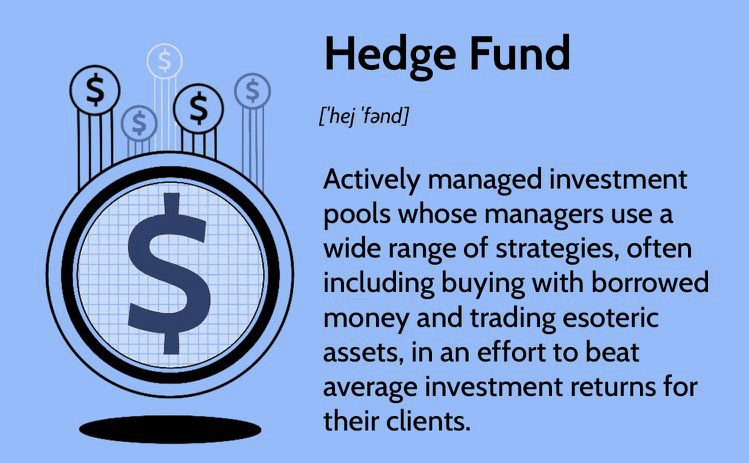What Is a Hedge Fund?
A hedge fund is a limited partnership of private investors whose money is managed by professional fund managers who use a wide range of strategies, including leveraging or trading of non-traditional assets, to earn above-average investment returns.
Hedge fund investment is often considered a risky alternative investment choice and usually requires a high minimum investment or net worth, often targeting wealthy clients.

Understanding the Hedge Fund
The term “hedge fund” defines this investment instrument as the manager of the fund often creating a hedged bet by investing a portion of assets in the opposite direction of the fund’s focus to offset any losses in its core holdings.
A hedge fund that focuses on a cyclical sector such as travel, may invest a portion of its assets in a non-cyclical sector such as energy, aiming to use the returns of the non-cyclical stocks to offset any losses in cyclical stocks.
Hedge funds use riskier strategies, leverage assets, and invest in derivatives such as options and futures. The appeal of many hedge funds lies in the reputation of their managers in the closed world of hedge fund investing.
Types of Hedge Funds
Hedge funds target select investments and pools of securities primed for gains. Four common types of hedge funds include:
- Global macro hedge funds are actively managed funds that attempt to profit from broad market swings caused by political or economic events.
- An equity hedge fund may be global or specific to one country, investing in lucrative stocks while hedging against downturns in equity markets by shorting overvalued stocks or stock indices.
- A relative value hedge fund seeks to exploit temporary differences in the prices of related securities, taking advantage of price or spread inefficiencies.
- An activist hedge fund aims to invest in businesses and take actions that boost the stock price which may include demands that companies cut costs, restructure assets or change the board of directors.
Common Hedge Fund Strategies
Hedge fund strategies cover a broad range of risk tolerance and investment philosophies using a large selection of investments, including debt and equity securities, commodities, currencies, derivatives, and real estate.
Common hedge fund strategies are classified according to the investme Australian nt styleof the fund’s manager and include equity, fixed-income, and event-driven goals.
A long/short hedge fund strategy is an extension of pairs trading, in which investors go long and short on two competing companies in the same industry based on their relative valuations.
A fixed-income hedge fund strategy gives investors solid returns, with minimal monthly volatility and aims for capital preservation taking both long and short positions in fixed-income securities.
An event-driven hedge fund strategy takes advantage of temporary stock mispricing, spawned by corporate events like restructurings, mergers and acquisitions, bankruptcy, or takeovers.
How Do Hedge Funds Make Money?
Australian investor Alfred Winslow Jones is credited with launching the first hedge fund in 1949 through his company, A.W. Jones & Co. Raising $100,000, he designed a fund that aimed to minimize the risk in long-term stock investing by short-selling, now referred to as the long/short equities model.
In 1952, Jones converted his fund to a limited partnership, added a 20% incentive fee as compensation for the managing partner, and became the first money manager to combine short selling, the use of leverage, and a compensation system based on performance.
Today, hedge funds employ a standard “2 and 20” fee system, a 2% management fee, and a 20% performance fee.
The management fee is based on the net asset value of each investor’s shares, so an investment of $1 million garners a $20,000 management fee that year to cover the operations of the hedge and compensate the fund manager.
The performance fee is commonly 20% of profits. If an investment of $1 million increases to $1.2 million in one year, $40,000 is the fee owed to the fund.
Hedge Fund vs. Mutual Fund
Hedge funds differ from mutual funds and hedge funds are not as strictly regulated by the Securities and Exchange Commission (SEC) as mutual funds are.
Mutual funds are a practical cost-efficient way to build a diversified portfolio of stocks, bonds, or short-term investments and are available to the general public and average investor.
Hedge funds can only accept money from accredited investors which includes individuals with an annual income that exceeds $200,000 or a net worth exceeding $1 million, excluding their primary residence. These investors are considered suitable to handle the potential risks that hedge funds are permitted to take.
A hedge fund can invest in land, real estate, stocks, derivatives, and currencies while mutual funds use stocks or bonds as their instruments for long-term investment strategies.
Unlike mutual funds where an investor can elect to sell shares at any time, hedge funds typically limit opportunities to redeem shares and often impose a locked period of one year before shares can be cashed in.
Hedge funds employ the 2% management fee and 20% performance fee structure. In 2021, the average expense ratio across all mutual funds and exchange-traded funds was 0.40% for the average investor.
What to Consider Before Investing
As investors research to identify hedge funds that meet their investment goals, they often consider the fund or firm’s size, the track record and longevity of the fund, the minimum investment required to participate, and the redemption terms of the fund. Hedge funds operate in many countries including the U.S., United Kingdom, Hong Kong, Canada, and France.
According to the SEC, investors should also do the following when deciding to invest in a hedge fund:
- Read the hedge fund’s documents and agreements which contain information about investing in the fund, the strategies of the fund, the location of the fund, and the risks anticipated by the investment.
- Understand the level of risk involved in the fund’s investment strategies and that they equate with personal investing goals, time horizons, and risk tolerance.
- Determine if the fund is using leverage or speculative investment techniques which will typically invest both the investors’ capital and the borrowed money to make investments.
- Evaluate potential conflicts of interest disclosed by hedge fund managers and research the background and reputation of the hedge fund managers.
- Understand how a fund’s assets are valued as hedge funds may invest in highly illiquid securities and valuations of fund assets will affect the fees that the manager charges.
- Understand how a fund’s performance is determined and whether it reflects cash or assets received by the fund as opposed to the manager’s estimate of the change in the value.
- Understand any limitations to time restrictions imposed to redeem shares.

Examples of Hedge Funds
As of 2022, the most notable hedge funds include:
- Elliot Management Corporation with a 55-year-long history and over $50 billion in assets under management (AUM). Its core holdings are in the energy sector.
- Bridgewater Associates is a global leader, with more than $235 billion in assets AUM, and a rate of return of 32% for the first half of 2022.
• Man Group offers a mix of long/short equity funds, private market funds, real estate funds, multi-asset funds, and fixed funds and its core value is responsible investing, which it achieves through its funds’ compliance with environmental, social, and governance ESG investing goals.

